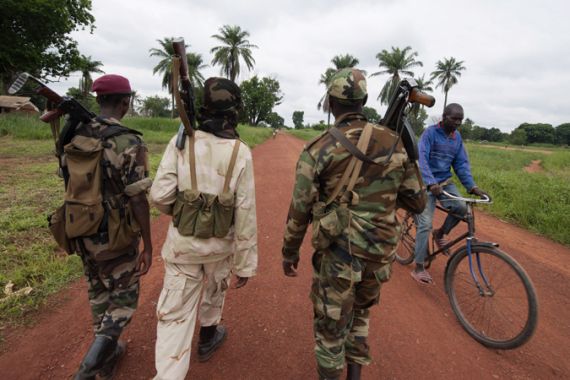CAR’s new president dissolves rebel group
Michel Djotodia disbands Seleka group blamed for wave of violence since March coup that toppled Francois Bozize.

Central African Republic’s new president has dissolved the rebel alliance that swept him to power, a group that has since been blamed for a wave of violence.
State radio on Friday broadcast a decree by President Michel Djotodia, declaring the Seleka rebel group dissolved “throughout the national territory”.
Seleka rebels seized the capital, Bangui, and overthrew leader Francois Bozize on March 23, the latest in a series of coups in the country that remains one of the world’s poorest despite its mineral resources.
The rebels have carried on looting and killing indiscriminately, witnesses have said.
French President Francois Hollande last month called for urgent UN action to stop the country slipping further into chaos.
Djotodia, sworn in as the country’s new president last month, was a former Seleka leader.
It was unclear what impact the order would have on Seleka, a loose alliance made up of five organisations. His order came the same week he dismissed the head of the armed forces after days of clashes with other fighters still loyal to Bozize that left 100 people dead.
“The measure taken by President Michel Djotodia will change nothing in terms of the behavior of the militia known as Seleka.
Human rights violations
President Djotodia is trying to create distance and confusion over the acts of abuse committed by their fighters,” said the chief of a Bangui neighbourhood.
Both the rebels and Bozize’s troops carried out summary executions, torture and other human rights violations during the fighting up to the March coup, the United Nations said in a report on Thursday.
“Seleka also engaged in sexual violence and grave violations against children,” the UN mission to the country, said in the report by the United Nations High Commissioner for Human Rights.
The report recommended that the new transitional government take urgent measures to restore security and screen both rebel fighters and soldiers of the national army.
International charities say they have been forced to put Seleka rebels on their payroll as guards as insurance against having their premises robbed.
The report also asked the UN rights council to look into a the human rights situation and, if possible, refer possible war crimes to the International Criminal Court.
A mix of local rebellions, banditry, ethnic tensions and spillover of conflicts from neighbouring countries have long undermined efforts to stabilise the landlocked former French colony.